中考英语重点知识归纳
中考英语知识点归纳
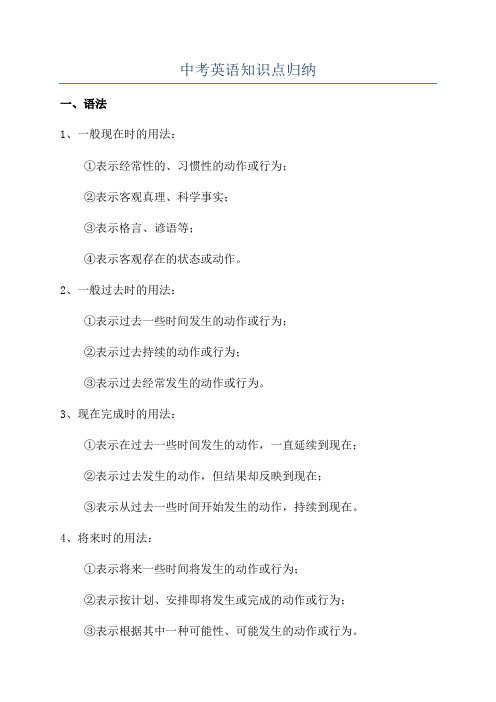
中考英语知识点归纳一、语法1、一般现在时的用法:①表示经常性的、习惯性的动作或行为;②表示客观真理、科学事实;③表示格言、谚语等;④表示客观存在的状态或动作。
2、一般过去时的用法:①表示过去一些时间发生的动作或行为;②表示过去持续的动作或行为;③表示过去经常发生的动作或行为。
3、现在完成时的用法:①表示在过去一些时间发生的动作,一直延续到现在;②表示过去发生的动作,但结果却反映到现在;③表示从过去一些时间开始发生的动作,持续到现在。
4、将来时的用法:①表示将来一些时间将发生的动作或行为;②表示按计划、安排即将发生或完成的动作或行为;③表示根据其中一种可能性、可能发生的动作或行为。
5、状语从句①时间状语从句:when, while, as soon as, until, before, after, since, as②条件状语从句:if, unless, as/so long as, in case, even if, even though;③让步状语从句:though, although, no matter, whatever;④地点状语从句:where, wherever;⑤原因状语从句:because, since, now that, as⑥结果状语从句:so that, so…that;⑦目的状语从句:so that, in order that;⑧方式状语从句:as, as if, as though。
二、重点短语1、go to bed 睡觉2、go to school 上学3、stand up 起立5、sit down 坐下6、get on 上车7、get off 下车8、eat out 外出吃饭9、by oneself 独自地10、ask for a leave 请假。
2023中考英语重点知识归纳笔记

一.英语语法重点与难点1、as…as…结构:你和汤姆是一样好的孩子。
You’re a boy as good as Tom.=You’re as good a boy as Tom.2、(1)too…to与so…that sb. can’t…的句型转换:前者为简单句,主语只有一个,而后者为复合句,主语有两个,试比较:The man was too angry to be able to speak.The man was so angry that he wasn’t able to speak.(2) too…to…与not enough to句型的转换:He is too young to get married.=He is not old enough to get married.The book is too difficult for me to read.=The book is not easy enough for me to read.3、形容词原级表示比较级含义:约翰不象迈克那么苯。
John is not so stupid as Mike.John is less stupid than Mike.John is cleverer than Mike.4、用比较级表示最高级:约翰是班里最高的男生。
John is taller than any other boy in the class.John is the tallest boy in the class.5、the more….. the more….表示“越……越……”:The more books you read, the wider your knowledge is.The more food you eat, the fatter you are.6、more and more….表示“越来……越……”:More and more students realized the importance of a foreign language.Our country is getting stronger and stronger.二.中考考点—词组1. after, in 这两个介词都可以表示“……(时间)以后”的意思after 以过去为起点,表示过去一段时间之后,常用于过去时态的句子中?如:She went after three days. 她是三天以后走的in 以现在为起点,表将来一段时间以后,常用于将来时态的句子中如:She will go in three days. 她三天以后要走2. how long, how often, how soonhow long指多长时间,主要用来对一段时间(如three days, four weeks 等)提问?如:How long ago was it? 这是多久前的事了?how often指每隔多久,主要用来对频率副词或状语(如once a week等)提问?如:—How often does he come here? —Once a month. 他(每隔)多久来一次?每月一次。
史上最全的中考英语语法知识点归纳

史上最全的中考英语语法知识点归纳一、词类和词性1.名词:可数名词、不可数名词、专有名词2.代词:人称代词、物主代词、反身代词、指示代词、不定代词、疑问代词、关系代词3.形容词:形容词的基本用法、比较级和最高级4.副词:副词的基本用法、比较级和最高级5.动词:动词的五种形式、时态、语态、情态动词、动词的非谓语形式6.连词:并列连词、从属连词、状语从句引导词7.介词:基本介词及其用法、固定介词短语8.冠词:不定冠词、定冠词、零冠词9.数词:基数词、序数词、分数词、倍数词10.感叹词:常见感叹词二、句子结构1.句子成分:主语、谓语、宾语、定语、状语、补语2.主谓一致:主语和谓语在人称和数上保持一致3.句型转换:陈述句、疑问句、祈使句、感叹句的转换4.句子的简单句、并列句、复合句、复合句类型(定语从句、状语从句、宾语从句)三、时态和语态1.一般现在时2.一般过去时3.现在进行时4.过去进行时5.一般将来时6.一般过去将来时7.现在完成时8.过去完成时9.现在完成进行时10.一般过去完成进行时11.被动语态四、非谓语动词1.不定式2.动名词3.动词-ing形式五、虚拟语气1.与事实相反的虚拟语气:与现在事实相反的虚拟语气、与过去事实相反的虚拟语气2.与将来事实相反的虚拟语气3.与现在条件相反的虚拟语气4.与过去条件相反的虚拟语气六、定语从句1.关系代词引导的定语从句2.关系副词引导的定语从句3.定语从句的嵌套七、状语从句1.时间状语从句2.地点状语从句3.方式状语从句4.原因状语从句5.条件状语从句6.比较状语从句7.目的状语从句8.结果状语从句八、宾语从句1.宾语从句的引导词2.宾语从句的位置九、名词性从句1.主语从句2.宾语从句3.表语从句十、情态动词1.can和could2.may和might3.will和would4.shall和should5.must和have to6.need和dare以上是中考英语语法知识点的简要归纳,更详细的内容需要根据课本和学习资料进行学习和理解。
中考英语知识点总结归纳

中考英语知识点总结归纳(1200字)中考英语考试是学生升学的重要门槛,需要掌握一定的英语知识点。
下面是对中考英语知识点的总结归纳,帮助学生梳理复习重点。
一、基础语法1.时态:简单现在时、一般过去时、一般将来时、一般过去将来时、现在进行时、过去进行时、将来进行时、现在完成时、过去完成时、将来完成时等。
2.动词的用法:be动词、情态动词、不定式、动名词等。
3.句型结构:肯定句、否定句、一般疑问句、特殊疑问句、祈使句、感叹句等。
4.并列连词:and, but, or, so等。
5.从句:宾语从句、主语从句、定语从句、状语从句等。
二、词汇与短语1.基本词汇:人物、地点、动物、事物、日常用语等。
2.时态词汇:过去、现在、将来等。
3.描述性词汇:形容词、副词,以及相关的程度副词等。
4.动作词汇:行为动词、运动动词等。
5.习惯用语:首先、其次、最后、比如、例如、由于、因此、所以、当然、不过、总之等。
三、听力理解1.听力题型:听音选图、听音选句子、听音排序、听音问答等。
2.听力技巧:注意细节、判断短语辨音、抓住关键词等。
3.听力材料:对话、短文等。
四、阅读理解1.阅读题型:选择题、判断题、填空题、配对题、排序题等。
2.阅读技巧:预读题目、略读全文、找关键词、根据上下文猜词义等。
3.阅读材料:图文、短文、说明文、广告等。
五、写作1.作文题目:提纲式作文、图画作文、故事作文、夹叙夹议作文等。
2.写作技巧:写作结构、使用恰当的语法和词汇、避免重复等。
3.写作要点:面面俱到地回答问题、逻辑清晰、语言表达流畅等。
六、口语表达1.日常用语:问候、介绍、邀请、道歉、表达感谢、提供帮助等。
2.礼貌用语:感谢、道歉、请求等。
3.提问与回答:问问题时要使用疑问词、回答问题时要简明扼要。
七、其他问题1.数词用法:基数词、序数词、分数等。
2.复合形容词:数量+名词+形容词、时间+名词+形容词等。
3.介词用法:表示时间、地点、原因、目的等。
初中英语中考重点知识点归纳
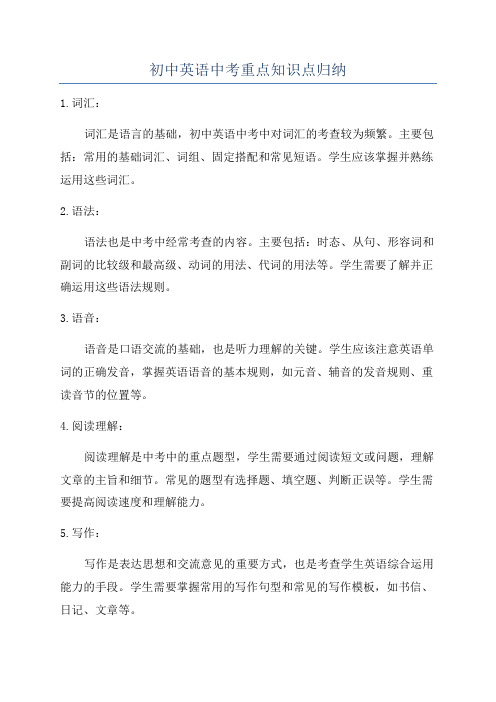
初中英语中考重点知识点归纳1.词汇:词汇是语言的基础,初中英语中考中对词汇的考查较为频繁。
主要包括:常用的基础词汇、词组、固定搭配和常见短语。
学生应该掌握并熟练运用这些词汇。
2.语法:语法也是中考中经常考查的内容。
主要包括:时态、从句、形容词和副词的比较级和最高级、动词的用法、代词的用法等。
学生需要了解并正确运用这些语法规则。
3.语音:语音是口语交流的基础,也是听力理解的关键。
学生应该注意英语单词的正确发音,掌握英语语音的基本规则,如元音、辅音的发音规则、重读音节的位置等。
4.阅读理解:阅读理解是中考中的重点题型,学生需要通过阅读短文或问题,理解文章的主旨和细节。
常见的题型有选择题、填空题、判断正误等。
学生需要提高阅读速度和理解能力。
5.写作:写作是表达思想和交流意见的重要方式,也是考查学生英语综合运用能力的手段。
学生需要掌握常用的写作句型和常见的写作模板,如书信、日记、文章等。
6.听力:中考中的听力考查主要是对学生听力理解的考察。
学生需要通过听录音理解短文或对话内容,回答问题。
学生应该提前做听力训练,提高听力能力。
7.口语:口语是交流的主要形式,也是中考中的一种考查内容。
学生需要提高口语表达能力,增加词汇量,训练语音和语调,加深对语法的理解,并勤于练习口语对话。
8.语境:语境是理解词汇和句子意义的关键。
学生应该通过阅读、听力和写作等方式,了解词汇和句子在不同语境中的用法和意义。
9.句子结构:句子结构的正确运用是英语表达的基础。
学生需要掌握英语句型的常见结构,如主谓宾结构、倒装句、虚拟语气、间接引语等。
10.表达能力:英语学习的目的是为了表达自己的思想和交流意见。
学生需要通过多种方式提高英语表达能力,如多读英语书籍、多听英语材料、多练习口语和写作等。
初中中考英语重点知识点归纳

初中中考英语重点知识点归纳
1.语法知识点:
-时态:一般现在时、一般过去时、一般将来时、现在进行时、过去
进行时、现在完成时、过去完成时等。
-数量和比较:可数名词和不可数名词的用法;形容词的比较级和最
高级;基数词和序数词的用法等。
-从句:宾语从句、定语从句、状语从句等。
-被动语态:现在时、过去时、一般将来时等。
2.词汇知识点:
-常用词汇:数字、颜色、人物、动物、食物等常见的英语词汇。
-词性转换:名词、动词、形容词和副词的相互转换等。
- 冠词和介词的使用:a/an、the、in、on、at等。
-阅读理解:根据文章内容回答问题;判断正误;填写表格等。
-阅读技巧:理解文章主旨;寻找关键信息;推测词义;理解上下文等。
4.听力技巧:
-听力材料:短对话、长对话、演讲、广播等。
-听力技巧:提前预测答案;注意听关键词;根据上下文推测答案等。
5.写作技巧:
-书面表达:写作时态、人称的正确运用;句型的变化;介绍人物或事物等。
-作文写作:写作结构;提纲;写作技巧等。
6.口语交际:
-相互交流:自我介绍、谈论兴趣爱好、描述事物等。
以上仅是初中中考英语的一些常见的重点知识点和技巧,学生们在备考中需要将这些知识点融会贯通,并在实践中加以运用。
此外,平时多做练习、积累常用的词汇和句型,多参加英语口语练习,能够更好地应对中考英语考试。
初中英语中考知识点详细归纳
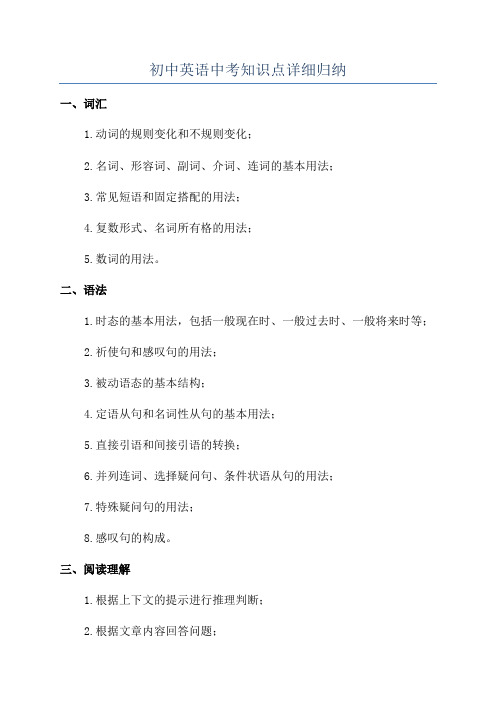
初中英语中考知识点详细归纳
一、词汇
1.动词的规则变化和不规则变化;
2.名词、形容词、副词、介词、连词的基本用法;
3.常见短语和固定搭配的用法;
4.复数形式、名词所有格的用法;
5.数词的用法。
二、语法
1.时态的基本用法,包括一般现在时、一般过去时、一般将来时等;
2.祈使句和感叹句的用法;
3.被动语态的基本结构;
4.定语从句和名词性从句的基本用法;
5.直接引语和间接引语的转换;
6.并列连词、选择疑问句、条件状语从句的用法;
7.特殊疑问句的用法;
8.感叹句的构成。
三、阅读理解
1.根据上下文的提示进行推理判断;
2.根据文章内容回答问题;
3.理解文章的主旨大意;
4.理解故事情节、人物性格、动作等。
四、听力
1.听懂对话、短文等基本信息;
2.根据听到的问题选择正确答案;
3.根据听到的对话或短文判断正误;
4.根据听到的对话或短文选择合适的图片。
五、写作
1.根据提供的提示或问题写作;
2.根据所给的素材进行写作;
3.书写规范,包括大小写、标点符号等;
4.语法正确、上下文连贯。
六、听说能力
1.参与简单的对话和问答;
2.能正确发音和拼写常见的单词;
3.能用正确的语音语调表达自己的需求和意愿。
七、其他
1.简单的英语国家的文化知识;
2.常见的英语国家的地理位置和名胜古迹;
3.了解英语国家的风俗习惯和节日。
以上是初中英语中考的知识点的详细归纳,包括词汇、语法、阅读理解、听力等多个方面。
考生可以针对这些知识点进行备考,提高自己的英语水平,取得好成绩。
英语中考知识点归纳
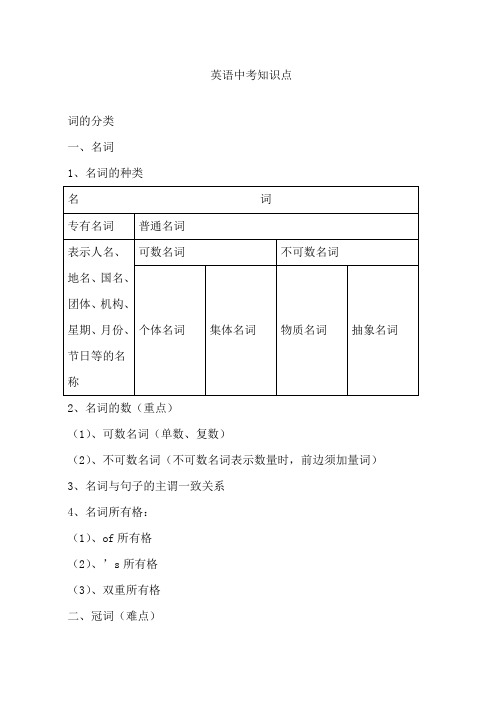
英语中考知识点词的分类一、名词1、名词的种类2、名词的数(重点)(1)、可数名词(单数、复数)(2)、不可数名词(不可数名词表示数量时,前边须加量词)3、名词与句子的主谓一致关系4、名词所有格:(1)、of所有格(2)、’s所有格(3)、双重所有格二、冠词(难点)1、不定冠词(a, an)的用法2、定冠词(the)的用法(记忆口诀:特指、重提和唯一;岛屿、海峡与海湾;海洋、党派最高级;沙漠、河流与群山;方位、顺序和乐器;年代、团体与机关;船名、建筑和组织;会议、条约与报刊;姓氏复数国全名。
)3、不用冠词的情况(有六种情况)三、数词1、数词的形2、数词的用法:基数词的读法、基数词变为序数词的方法、数词的复数形式3、数词的表示方法及读法:(1)、分数的表示方法及读法(2)、小数的表示方法及读法(3)、百分数的表示方法及读法4、年、月、日、时刻的表示方法及读法四、代词1、人称代词的用法及五种形式的区别(1)、主格和宾格的用法(2)、性别、单复数的区分2、物主代词(2)、名词性物主代词和“形容词性物主代词+名词”3、指示代词(1)、分类(this,that/these,those/such/same)(2)、用法4、自身代词和相互代词(oneself/each other)5、不定代词(难点)(1)、七类不定代词及用法a. some与anyb. little, a little与 few, a fewc. many, much 与a lot ofd. each 与everye. both, all与 neither, nonef. all 与everyg. one, other, the other, others 与another(2)、不定代词修饰形容词时的用法6、关系代词(that, which, who)引导宾、状、定语从句时的用法7、疑问代词(what, who, whom, whose, which,等)五、形容词、副词(难点)1、形容词、副词比较级的构成(重点)2、形容词、副词最高级的构成3、形容词、副词修辞法及构词法4、形容词、副词的用法及在句子中的位置5、一些重要的形容词、副词句型(难点)It is + adj. + for/ of sb. + to do sth.keep sb./sth. + adj.so + adj./ adv. + that + 从句too + adj./adv. + to do sth.get/ become/ turn/ feel/ … + 形容词adj. + to do sth.adj. + enough to do sth6、用形容词、副词搭配构成的动词短语六、动词1、动词的种类(实义动词,连系动词,助动词,情态动词)2、动词短语3、动词的基本形式4、动词的时态(重点)一般现在时,一般过去时,现在进行时,过去进行时,一般将来时,过去将来时,现在完成时,过去完成时。
中考英语考点归纳(全)
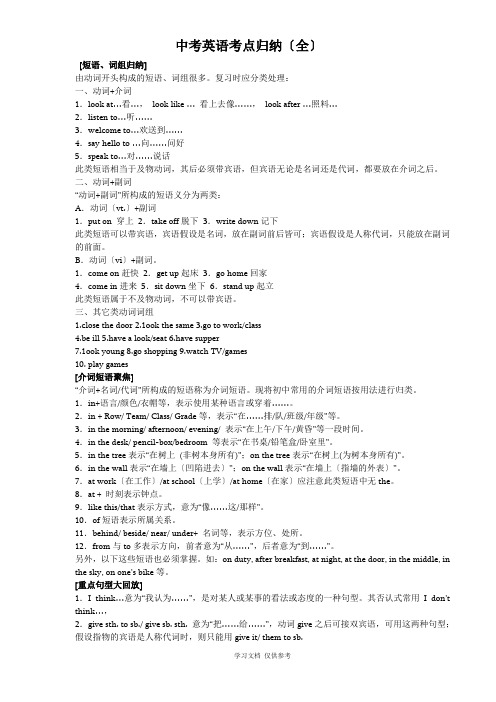
中考英语考点归纳〔全〕[短语、词组归纳]由动词开头构成的短语、词组很多。
复习时应分类处理:一、动词+介词1.look at…看…,look like … 看上去像……,look after …照料…2.listen to…听……3.welcome to…欢送到……4.say hello to …向……问好5.speak to…对……说话此类短语相当于及物动词,其后必须带宾语,但宾语无论是名词还是代词,都要放在介词之后。
二、动词+副词“动词+副词”所构成的短语义分为两类:A.动词〔vt.〕+副词1.put on 穿上2.take off脱下3.write down记下此类短语可以带宾语,宾语假设是名词,放在副词前后皆可;宾语假设是人称代词,只能放在副词的前面。
B.动词〔vi〕+副词。
1.come on赶快2.get up起床3.go home回家4.come in进来5.sit down坐下6.stand up起立此类短语属于不及物动词,不可以带宾语。
三、其它类动词词组1.close the door2.1ook the same3.go to work/class4.be ill5.have a look/seat6.have supper7.1ook young 8.go shopping 9.watch TV/games10. play games[介词短语聚焦]“介词+名词/代词”所构成的短语称为介词短语。
现将初中常用的介词短语按用法进行归类。
1.in+语言/颜色/衣帽等,表示使用某种语言或穿着……。
2.in + Row/ Team/ Class/ Grade等,表示“在……排/队/班级/年级”等。
3.in the morning/ afternoon/ evening/ 表示“在上午/下午/黄昏”等一段时间。
4.in the desk/ pencil-box/bedroom 等表示“在书桌/铅笔盒/卧室里”。
中考英语必考知识点

中考英语必考知识点一、词汇1.数字:数词、序数词、基数词、小数、分数等。
2.动词:时态、语态、非谓语动词(动词不定式、动名词、分词)、不规则动词等。
3.名词:单复数、可数不可数名词、所有格等。
4.形容词和副词:基本形容词和副词的比较级和最高级形式、形容词修饰的名词、副词修饰的动词、能够修饰形容词和副词的比较结构等。
5.连词:连词的种类、用法及连接词语的句子等。
6.代词:人称代词、指示代词、反身代词等。
7.冠词:冠词的种类、用法及其词组等。
8.介词:基本介词及其意义及用法、词组等。
9.情态动词:情态动词的种类、用法及其词组等。
10.疑问句:特殊疑问句、一般疑问句、选择疑问句等。
11.否定句:否定句的构成、否定词的位置等。
12.句子的基本成分:主语、谓语、宾语、表语、定语、状语等。
13.句型:陈述句、祈使句、感叹句、特殊疑问句、条件句、比较句等。
二、语法1.时态:一般现在时、一般过去时、一般将来时、现在进行时、过去进行时、将来进行时、现在完成时、过去完成时等。
2.语态:主动语态、被动语态。
3.非谓语动词:动词不定式、动名词、现在分词、过去分词的形式和用法。
4.名词性从句:主语从句、宾语从句、表语从句、同位语从句等。
5.定语从句:限制性定语从句、非限制性定语从句等。
6.状语从句:条件状语从句、时间状语从句、原因状语从句、方式状语从句、结果状语从句等。
7.并列句:并列句的连接及词组等。
8.书面表达:书信、应用文、记叙文、描写文、议论文、说明文等。
三、听力1.录音材料:记笔记、填空、选择等。
2.各种对话:日常交流、购物、问路、订酒店、预约、介绍、感叹等。
3.各种情景对话:图画、短文、故事等。
四、阅读理解4.夹叙夹议:根据短文内容综合归纳、评述、解释等。
五、写作1.书信:常见的书信格式、内容及写作要点等。
2.对话:场景对话、日常对话、情景对话等。
3.日记:时间、地点、人物、事件、感受等。
中考英语知识点全汇总
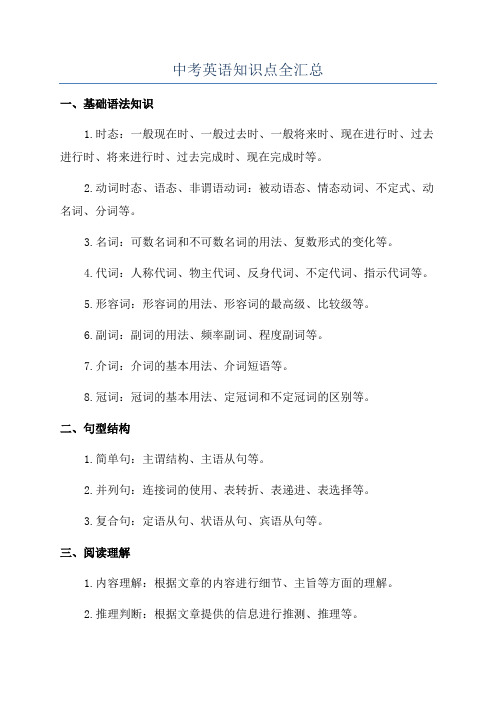
中考英语知识点全汇总一、基础语法知识1.时态:一般现在时、一般过去时、一般将来时、现在进行时、过去进行时、将来进行时、过去完成时、现在完成时等。
2.动词时态、语态、非谓语动词:被动语态、情态动词、不定式、动名词、分词等。
3.名词:可数名词和不可数名词的用法、复数形式的变化等。
4.代词:人称代词、物主代词、反身代词、不定代词、指示代词等。
5.形容词:形容词的用法、形容词的最高级、比较级等。
6.副词:副词的用法、频率副词、程度副词等。
7.介词:介词的基本用法、介词短语等。
8.冠词:冠词的基本用法、定冠词和不定冠词的区别等。
二、句型结构1.简单句:主谓结构、主语从句等。
2.并列句:连接词的使用、表转折、表递进、表选择等。
3.复合句:定语从句、状语从句、宾语从句等。
三、阅读理解1.内容理解:根据文章的内容进行细节、主旨等方面的理解。
2.推理判断:根据文章提供的信息进行推测、推理等。
3.表达能力:根据文章的要求进行写作、归纳总结等。
四、口语表达1.询问:询问信息、询问意见等。
2.辩论:陈述自己的观点、提出理由等。
3.请求:请求帮助、请求许可等。
4.提醒:提醒他人注意事项、提醒日程安排等。
5.道歉:道歉表达、解释原因等。
五、写作技巧1.写作表达:书信写作、日记写作、演讲稿写作等。
2.句子表达:句子的连贯性、句子的多样性等。
3.表达方式:使用形容词、副词、比喻、排比等方式进行表达。
4.逻辑结构:文章段落的开头、结尾、过渡等。
六、听力技巧1.理解题目:理解题干的意思、答题要求等。
2.抓关键词:抓住关键词帮助理解听力材料。
3.预测猜测:根据题干的提示预测可能听到的内容。
4.注意视听:注意听力材料中的重要信息、时间、地点等。
七、词语运用1.同义词、反义词的辨析。
2.词组的搭配。
3.词义的辨析。
八、语篇搭配1.对话:问答形式、交际用语等。
中考英语知识点归纳2024
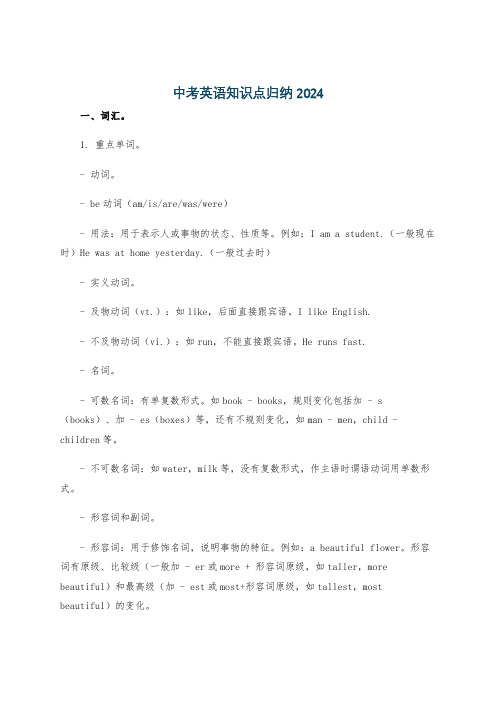
中考英语知识点归纳2024一、词汇。
1. 重点单词。
- 动词。
- be动词(am/is/are/was/were)- 用法:用于表示人或事物的状态、性质等。
例如:I am a student.(一般现在时)He was at home yesterday.(一般过去时)- 实义动词。
- 及物动词(vt.):如like,后面直接跟宾语。
I like English.- 不及物动词(vi.):如run,不能直接跟宾语。
He runs fast.- 名词。
- 可数名词:有单复数形式。
如book - books,规则变化包括加 - s (books)、加 - es(boxes)等,还有不规则变化,如man - men,child - children等。
- 不可数名词:如water,milk等,没有复数形式,作主语时谓语动词用单数形式。
- 形容词和副词。
- 形容词:用于修饰名词,说明事物的特征。
例如:a beautiful flower。
形容词有原级、比较级(一般加 - er或more + 形容词原级,如taller,more beautiful)和最高级(加 - est或most+形容词原级,如tallest,most beautiful)的变化。
- 副词:用于修饰动词、形容词或其他副词。
例如:He runs quickly. 副词的比较级和最高级变化规则与形容词相似。
2. 词汇拓展。
- 前缀:如un -(unhappy,unlucky)表示否定;re -(reuse,rewrite)表示“再,重新”。
- 后缀:- er(worker,teacher)表示人;- ful(careful,helpful)表示“充满……的”。
3. 固定搭配。
- 动词短语。
- look forward to(期待),后面接名词或动名词。
I'm looking forward to your reply.- pay attention to(注意),同样接名词或动名词。
中考所有英语知识点归纳

中考所有英语知识点归纳一、单词拼写1. 名词复数形式的构成规则,如box—boxes2. 形容词比较级与最高级的构成规则,如big—bigger—biggest3. 动词的过去式与过去分词的构成规则,如go—went—gone4. 动词第三人称单数形式的构成规则,如watch—watches5. 动词-ing形式的构成规则,如swim—swimming6. 词根词缀法拼写单词,如telephone, impossible二、时态1. 一般现在时、现在进行时、一般过去时、过去进行时、一般将来时、现在完成时的构成和用法2. 过去将来时、过去完成时的用法三、名词1. 可数与不可数名词2. 计量名词的用法3. 名词所有格的构成规则,如Tom的书4. 名词的单复数变化规则四、代词1. 人称代词的主格和宾格形式2. 物主代词的形式和用法,如mine, yours3. 反身代词的形式和用法,如myself, yourself4. 不定代词的形式和用法,如some, any, every, each, both, either, neither五、形容词和副词1. 形容词的位置和用法,如a big house, a nice girl2. 比较级和最高级的构成和用法,如taller, the tallest3. 副词的用法,如slowly, fast六、动词1. 不规则动词的变化规则,如go—went—gone2. 动词的短语形式,如look after, take off3. 动词不定式的形式和用法,如to go, go shopping4. 动词的时态和语态变化,如is going to do, was done5. 动名词的构成和用法,如swimming, enjoy swimming七、时态和语态1. 一般现在时、一般过去时、一般将来时、现在进行时、过去进行时、过去将来时、现在完成时、过去完成时的构成和用法2. 被动语态的构成和用法,如The book is written by Tom.3. 完成时态与被动语态的综合运用八、介词1. 常用介词的用法,如in, on, at2. 特殊介词的用法,如into, through, between九、连词1. 并列连词的用法,如and, but, or2. 引导从句的连词,如when, if, because十、冠词1. 定冠词和不定冠词的用法,如a book, an apple, the sun2. 特指某人某物的用法,如the girl, the car3. 不用冠词的情况,如go to school, at home十一、句式1. 肯定句、否定句、一般疑问句、特殊疑问句的基本结构和用法2. 直接引语和间接引语的转换,如He said, "I am happy." → He said that he was happy.3. 各种句式在实际交际中的综合运用以上是中考英语知识点的一个大致归纳,希望对你有所帮助。
中考英语重点知识归纳
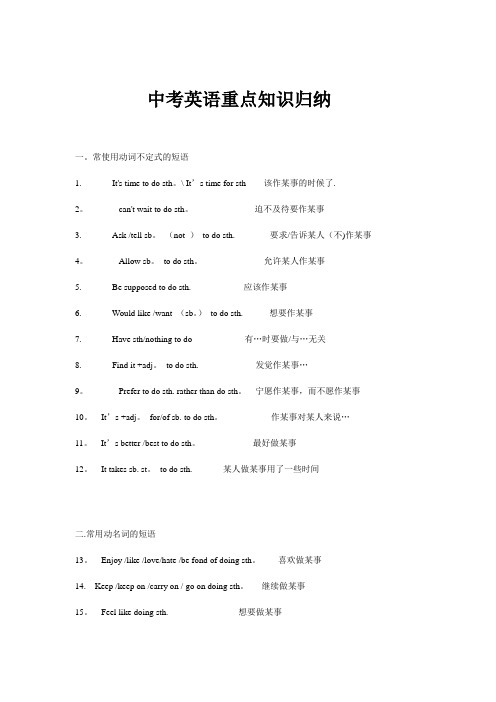
中考英语重点知识归纳一。
常使用动词不定式的短语1. It's time to do sth。
\ It’s time for sth 该作某事的时候了.2。
can't wait to do sth。
迫不及待要作某事3. Ask /tell sb。
(not )to do sth. 要求/告诉某人(不)作某事4。
Allow sb。
to do sth。
允许某人作某事5. Be supposed to do sth. 应该作某事6. Would like /want (sb。
)to do sth. 想要作某事7. Have sth/nothing to do 有…时要做/与…无关8. Find it +adj。
to do sth. 发觉作某事…9。
Prefer to do sth. rather than do sth。
宁愿作某事,而不愿作某事10。
It’s +adj。
for/of sb. to do sth。
作某事对某人来说…11。
It’s better /best to do sth。
最好做某事12。
It takes sb. st。
to do sth. 某人做某事用了一些时间二.常用动名词的短语13。
Enjoy /like /love/hate /be fond of doing sth。
喜欢做某事14. Keep /keep on /carry on / go on doing sth。
继续做某事15。
Feel like doing sth. 想要做某事16. Practice doing sth。
练习作某事17。
Give up doing sth. =stop doing Sth。
放弃作某事18。
Be good at/ do well in doing sth。
擅长作某事19。
Pay attention to doing sth. 注意作某事20。
What about/ how about doing sth。
中考英语知识点归纳汇总-详细
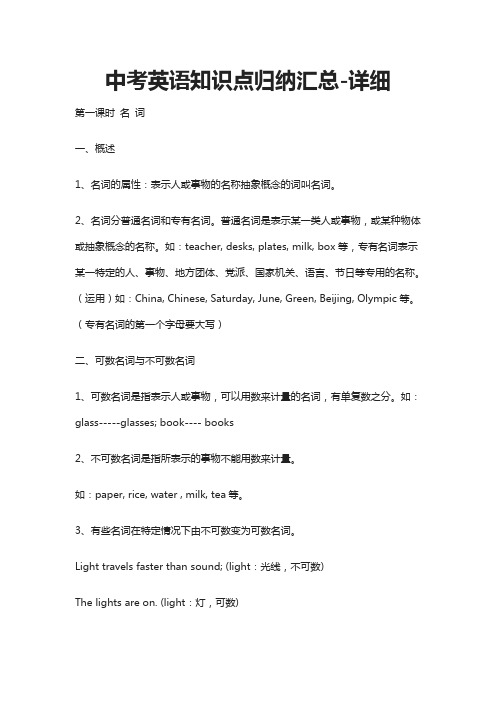
中考英语知识点归纳汇总-详细第一课时名词一、概述1、名词的属性:表示人或事物的名称抽象概念的词叫名词。
2、名词分普通名词和专有名词。
普通名词是表示某一类人或事物,或某种物体或抽象概念的名称。
如:teacher, desks, plates, milk, box等,专有名词表示某一特定的人、事物、地方团体、党派、国家机关、语言、节日等专用的名称。
(运用)如:China, Chinese, Saturday, June, Green, Beijing, Olympic等。
(专有名词的第一个字母要大写)二、可数名词与不可数名词1、可数名词是指表示人或事物,可以用数来计量的名词,有单复数之分。
如:glass-----glasses; book---- books2、不可数名词是指所表示的事物不能用数来计量。
如:paper, rice, water , milk, tea等。
3、有些名词在特定情况下由不可数变为可数名词。
Light travels faster than sound; (light:光线,不可数)The lights are on. (light:灯,可数)4、不可数名词的量的表示不可数名词一般无法用数来计算,前面不能用a或an或数词来表示数量,它的量往往借助于容器来表示。
如:a glass of milk ------ four glasses of milka piece of paper------two pieces of papera bag of rice------three bags of rice三、可数名词的复数形式(识记、运用)1、可数名词在应用时有单复数之分,单数变复数有规则变化和不规则变化两种。
规则变化情况变化形式例词一般情况加-sgirls; books;以s,x,ch,sh结尾的名词加-esclasses; boxes; watches;brushes以辅音字母加y结尾的名词变y为i, 加escity---cities; baby---babies以f或fe结尾的名词变f,fe为v, 加esknife---knives; leaf---leaves以O结尾的名词potatoes; tomatoes;photos; kilos; bamboos; radios 2、少数名词有不规则的变化形式policeman---policemen; man---men; woman---women; tooth---teeth; foot---feet; sheep---sheep; deer---deer; Japanese--- Japanese; Chinese --- Chinese; fish --- fish 四、名词所有格(运用)名词的所有格是表示所有关系的形式,它也有构成上的变化。
中考英语知识点总结归纳完整版
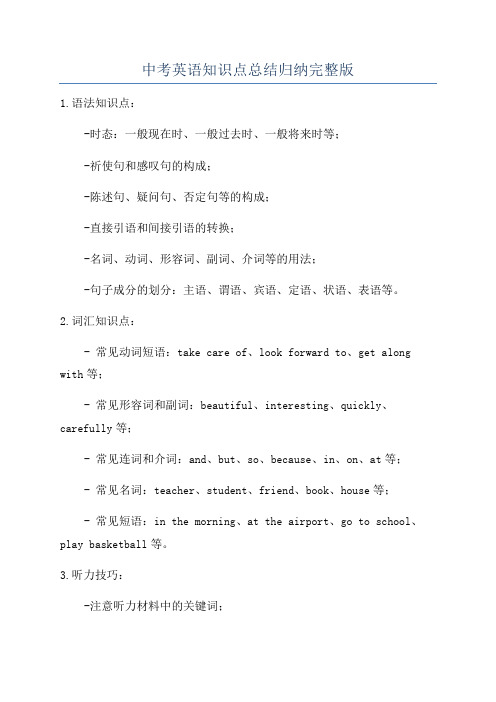
中考英语知识点总结归纳完整版1.语法知识点:-时态:一般现在时、一般过去时、一般将来时等;-祈使句和感叹句的构成;-陈述句、疑问句、否定句等的构成;-直接引语和间接引语的转换;-名词、动词、形容词、副词、介词等的用法;-句子成分的划分:主语、谓语、宾语、定语、状语、表语等。
2.词汇知识点:- 常见动词短语:take care of、look forward to、get along with等;- 常见形容词和副词:beautiful、interesting、quickly、carefully等;- 常见连词和介词:and、but、so、because、in、on、at等;- 常见名词:teacher、student、friend、book、house等;- 常见短语:in the morning、at the airport、go to school、play basketball等。
3.听力技巧:-注意听力材料中的关键词;-学会通过语境猜测单词或句子的含义;-练习听力材料,培养听力技巧;-注意听力材料中的谁在说话,对话中涉及的时间、地点、人物等信息。
4.阅读技巧:-集中注意力,全面理解文章的主旨;-注意文章的结构,抓住重点信息;-养成查字典和阅读长难句的习惯;-利用文章中的标点符号和图片等辅助理解。
5.写作技巧:-根据提纲或要求进行写作;-注意时态和语法的正确运用;-按照逻辑,合理组织文章的结构;-使用恰当的过渡词和连接词来连接句子和段落。
6.口语表达:-多进行口语练习,提高口语表达能力;-学会使用一些常用口语表达,如问候、道歉、感谢等;-注意语音语调的准确使用,避免重音和发音错误;-学会用简单明了的语言来表达自己的观点和观察。
7.语言文化:-学习英语国家的文化习俗和传统;-学习一些英语国家的历史和风景名胜;-了解英语国家的重要节日和庆祝活动;-学习英语国家的主要宗教和节日习俗。
中考英语考试涉及到的知识点比较广泛,以上总结的内容是其中的一部分。
中考英语知识点归纳

中考英语知识点归纳(经典版)编制人:__________________审核人:__________________审批人:__________________编制单位:__________________编制时间:____年____月____日序言下载提示:该文档是本店铺精心编制而成的,希望大家下载后,能够帮助大家解决实际问题。
文档下载后可定制修改,请根据实际需要进行调整和使用,谢谢!并且,本店铺为大家提供各种类型的经典范文,如工作报告、工作计划、活动方案、规章制度、演讲致辞、合同协议、条据文书、教学资料、作文大全、其他范文等等,想了解不同范文格式和写法,敬请关注!Download tips: This document is carefully compiled by this editor. I hope that after you download it, it can help you solve practical problems. The document can be customized and modified after downloading, please adjust and use it according to actual needs, thank you!Moreover, our store provides various types of classic sample essays, such as work reports, work plans, activity plans, rules and regulations, speeches, contract agreements, documentary evidence, teaching materials, complete essays, and other sample essays. If you would like to learn about different sample formats and writing methods, please pay attention!中考英语知识点归纳其实,在初中阶段中,很多人想要了解初中英语有哪些重要的知识点,中考英语中必背的重点英语知识有哪些呢?以下是本店铺为大家带来的2024年中考英语知识点归纳,欢迎参阅呀!2024年中考英语知识点归纳1 (see 、hear 、notice 、find 、feel 、listen to 、look at1 (感官动词)+do eg:I like watching monkeys jump2 (比较级 and 比较级)表示越来越怎么样3 a piece of cake=easy 小菜一碟(容易)4 agree with sb 赞成某人5 all kinds of 各种各样 a kind of 一样6 all over the world= the whole world 整个世界7 along with同。
中考英语语法知识点总结归纳

中考英语语法知识点总结归纳一、名词。
1. 名词的数。
- 可数名词:有单复数形式。
- 规则变化:- 一般在词尾加 -s,如book - books。
- 以s, x, ch, sh结尾的名词加 -es,如box - boxes,watch - watches。
- 以辅音字母 + y结尾的名词,变y为i再加 -es,如baby - babies;但以元音字母 + y结尾的名词直接加 -s,如day - days。
- 以f或fe结尾的名词,变f或fe为v再加 -es,如knife - knives,leaf - leaves(但也有一些直接加 -s的,如roof - roofs)。
- 不规则变化:- 单复数同形,如fish(表示鱼的种类时可加 -es),sheep,deer等。
- 改变元音字母,如man - men,woman - women,foot - feet,tooth - teeth 等。
- 表示“某国人”的复数:- 中日不变,如Chinese - Chinese,Japanese - Japanese。
- 英法变,如Englishman - Englishmen,Frenchman - Frenchmen。
- 其他加 -s,如American - Americans。
- 不可数名词:没有复数形式,不能直接用数词修饰,如water,milk,bread 等。
如果要表示数量,可以用“a piece of/a glass of/a cup of +不可数名词”等结构。
2. 名词所有格。
- 有生命的名词所有格:- 一般在名词后加's,如Tom's book。
- 以s结尾的复数名词只加',如the students' classroom。
- 表示两者或多者共有时,只在最后一个名词后加's,如Lucy and Lily's room (表示两人共有的房间);表示各自拥有时,每个名词后都加's,如Lucy's and Lily's rooms(表示两人各自的房间)。
- 1、下载文档前请自行甄别文档内容的完整性,平台不提供额外的编辑、内容补充、找答案等附加服务。
- 2、"仅部分预览"的文档,不可在线预览部分如存在完整性等问题,可反馈申请退款(可完整预览的文档不适用该条件!)。
- 3、如文档侵犯您的权益,请联系客服反馈,我们会尽快为您处理(人工客服工作时间:9:00-18:30)。
中考英语重点知识归纳一.常使用动词不定式的短语1. It’s time to do sth.\ It’s time for sth 该作某事的时候了.2. can’t wait to do sth. 迫不及待要作某事3. Ask /tell sb. (not ) to do sth. 要求/告诉某人(不)作某事4. Allow sb. to do sth. 允许某人作某事5. Be supposed to do sth. 应该作某事6. Would like /want (sb.) to do sth. 想要作某事7. Have sth/nothing to do 有…时要做/与…无关8. Find it +adj. to do sth. 发觉作某事…9. Prefer to do sth. rather than do sth. 宁愿作某事,而不愿作某事10. It’s +adj. for/of sb. to do sth. 作某事对某人来说…11. It’s better /best to do sth. 最好做某事12. It takes sb. st. to do sth. 某人做某事用了一些时间二.常用动名词的短语13. Enjoy /like /love/hate /be fond of doing sth. 喜欢做某事14. Keep /keep on /carry on / go on doing sth. 继续做某事15. Feel like doing sth. 想要做某事16. Practice doing sth. 练习作某事17. Give up doing sth. =stop doing Sth. 放弃作某事18. Be good at/ do well in doing sth. 擅长作某事19. Pay attention to doing sth. 注意作某事20. What about/ how about doing sth. ….怎么样(好吗)21. Thank you for doing sth. 为…感谢某人22. Mind doing sth. 介意作某事23. Be used for doing sth./ be used to do sth. 被用来作某事24. Spend …(in) doing sth. 花时间作某时25. Be busy doing/ with sth. 忙于作某事26. Finish doing sth. 作完某时27. Make a contribution to doing sth. 在…做贡献28. Look forward to doing Sth.29. Prefer doing sth. to doing sth. 喜欢…胜过…30. Be/get used to doing sth. 习惯作某事31. Keep / stop/ prevent sb. from doing sth. 阻止某人作某事32. have problems/ difficulty (in) doing sth.做某事有….麻烦三.省略动词不定式的短语33. 一感二听三使役四看半帮助34. See/ hear/ feel/ notice/ look at /listen to sb. do sth.看见/听见/感觉/注意某人作某事35. Make /let /have sb. do sth. 使/让某人做某事36. Help sb. (to) do sth/ with sth. 帮助某人作某事37. Had better (not) to sth. 最好(不)做某事38. Why don’t you/ not do sth. 为什么不作某事39. Would /Will / Could you please (not) do sth.请你(不)作某事好吗四、同(近)义词比较40. Stop to do sth. 停下来正在做的事去作另一件事Stop doing sth. 停止正在作的事Eg. When the teacher came into the classroom, the students stopped talking. After he worked for an hour, he stopped to have a rest.41. Forget / remember to do sth. 忘记/记得要去作某事Forget / remember doing sth. 忘记记得曾经做过某事Eg. Please remember to bring my book to school.I remember doing my homework42. used to do sth. 过去常常作某事be used to do sth. 被用来作某事be used to doing sth. 习惯于作某事eg. My father used to smoking.Wood is used to make paper.I am used to getting up early.43. . So +be/助动词/情态动词 + 主语…也一样So +主语+be/助动词/ 情态动词是呀,表示赞同别人的观点Nor/Neither + be /助动词/ 情态动词+主语…也不一样(用于否定句)Eg. He has been to Beijing. So have I.i. It’s a fine day. So it is.ii. She doesn’t like eggs. Neither do I.44. too+adj. /adv…to do sth. 太…而不能…i. so +adj. /adv + that(从句) 如此…以致…ii. such +(a/an +adj.)+n.+ that(从句) 如此…以致…iii. (not) enough (for sb.) to do sth. (对某人来说)做某事(不)够Eg. The boy is too young to go to school.iv. The boy is so young that he can’t go to school.v. He is such a young boy that he can’t go to school.vi. The boy is not old to go to school.五、常考知识点45. keep +adj. 保持…状态keep (sb.) doing sth. 继续做某事/使某人老是做某事eg. Everyone should keep our classroom clean.i. It’s too late, but he still keeps working.ii. Lily always keeps us waiting for her.46. make + n. 使某人成为a) make + sb. + adj. 使某人…b) make sb. do sth. 使某人做某事c) Sb. be made to sth. 某人被迫做某事Eg. We made Peter our monitor.i. Books make us happy.ii. He often makes me laugh.iii. The workers were made to work 12 hours a day.47. I don’t think that 我认为…不Eg. I don’t think you are right,are you48. It’s /has been+ some time +since+一般过去时…自从…以来有多久了Eg. It has been two years since we met last time.49. What do you mean by/ What does .. mean 是什么意思Eg. What do you mean by “computer”/What does “computer”mean50. What do you think of…/How do you like …你认为…怎么样Eg. What do you think of this film /How do you like this film51. What is/was/will …be like ..怎么样Eg. What is the weather likeWhat will the life in the future be like52. It’s said/ reported that…据说/据报道Eg. It’s said that the population of the word would be 6 bil lion in 2o5o.53. one of the 形容词最高级+名词复数…其中之一Eg. Shanghai is one of the biggest cities in China.54. Neither…nor…既不…也不(两者都不)i. either or…要么…要么/或者…或者/不是…就是ii. not only…but also…不但…而且iii. 以上三个词做主语时,要用就近原则Eg. Neither you nor he has been to the USA.iv. Either he or you go to the park.v. Not only my mother but also my father is a teacher.55. 比较级+ than +any other +名词单数…比其余任何一个…比较级+ than + the other+名词复数Eg. Shanghai is bigger than any other city/the other cities in China.56. When(当…的时候), if (如果), as soon as(一…就), until(直到…才), unless (除非/如果…不)这几个词引导的时间或条件状语从句时,主句要用一般将来时.Eg. I will call you when he comes.i. If it doesn’t rain tomorrow, we will have a picnic.ii. As soon as I get to Beijing, I’ll come to see you.iii. He won’t go to bed until his parents come back.iv. Unless you work hard, you won’t catch up with others.六.常用句型间的转换is wrong with.../There is something wrong with/Sth. doesn’t work/Sth. is broken.57. It's time to do…./It's time for sth.58. Let's do sth. shall we59. Why don't you do sth./Why not do sth61. How is the weather/What's the weather like61. How do you like…/What do you think of…62. Turn left(right) at the second crossing./Take the second turning on the right/left.63. Sth. cost(s) sb. money./Sb pay(s) money for sth./Sb spend(s) money buying/on sth.64. Can you tell me the to…/Which is the way to…/Can you tell me how to get to…65. look after well/takegood care of..; have a good time /enjoy oneself/have fun doing;give sb a call(ring)/ring up/make a telephone call; all by oneself/alone;miss/not catch;fall asleep/get to sleep;be different from/not the same;send for/ask sb to come;be good at/do well in;hear from/get(receive,have) a letter from;66…..after(when)/not…until……66. like….better than…./prefer to do…..67. when ….years old/….at the age of…68. so…that sb can't /couldn't/too…for sb to do/not….enough for sb to do …69. 主语+谓语+宾语从句/主语+谓语+疑问词+to do.中考英语必会词组和短语A开头A bottle of 一瓶A glass of 一杯A cup of 一杯A little 一点,少量的A few 一些,少数几个A lot 很,非常A lot of 许多,大量A piece of 一片(一张,一块)A bit (of)少量(的),一点A pair of 一对,一双A moment later 片刻之后A place of interest 名胜A moment ago 刚才All day 一整天,一天到晚All right 好,行,不错All the same 仍然,还是All the time 一直,始终,总是All the year round 一年到头All by oneself 独立,单独All kinds of 各种各样的All over 遍及After a while 过了一会儿Again and again 再三地,一再地,反复地Ask for 请求,询问As.................as 与.......一样As soon as 一.........就............ As usual 像平常一样As if 好像As long as 长达,只要As soon as possible因可能早地,尽快As well 也,又,同样地At home 在家At school 在学校At work 在工作At night 在夜里At first 起初At the end of 在....结尾,到.......尽头At the same time 同时At times 有时,偶尔At once 立刻,马上At midnight 在半夜At the head of 在........的前头At the moment 此刻At last 终于,最后At least 至少,起码At sea 在大海上At the age of 在......岁时At the beginning of 起初,开始B开头Be full of 充满..........Be good at 在.....方面(学得,做得)Be later for 迟到Be able to 能,会Be afraid of 害怕Be amazed at 对.....感到惊讶Be busy doing 忙于.......Be excited about 对....感到兴奋Be filled with 用.......充满Be made of 由..组成,由.....构成(物理变化) Be made in 在.......生产或制造Be pleased with 对....感到满意Be proud of 以...而自豪Be used to 用于Be born 出生于Be angry with 对(某人)发脾气Be awake 醒着的Be famous for 因....而有名Be fed up with 厌倦Be interest in 对....感兴趣Be/get lost 迷失(道路)Before long 不久Beg one's pardon 请原谅,对不起Both....and... ......和......都.........(指两人或物) By air /plane /sea/ship 乘飞机/船By the way 顺便说,顺便问一下By the time 到.......的时候C开头Come in 进来,进入Come on 来吧,跟着来,赶快Come out 出来,开花,发芽Come over 过来,顺便来Catch up with 赶上Come to oneself 苏醒,恢复知觉Come down 下来,落下Come true 实现Come up with 找到,提出Clean up 清除,收拾干净Carry on 坚持下去Cut down 砍倒D开头Do one's homework 做作业Do (some )reading 朗读,阅读Do one's best 尽最大努力,尽力Do well in 在.....方面干得好Drop off 放下(某物), 下车E开头Each other 互相Either ..... Or...... 或者.....或者..... Enjoy oneself 过得快乐,玩的愉快Even thought 即使Ever sine 从那时起,此后一直F开头Family tree 家谱Family name 姓From ...to ....从....到......Fall down 倒下,跌倒,从....落下Field top 野外旅游Fall asleep 睡觉,入睡Fall off (从....)掉下Find out 找出,查出First of all 首先,第一G开头Get up 起床Get down 下来,落下Get to 到达Ger married 结婚Get together 相聚Get back 取回Get off 下来,从...下来Get on well with 与...相处融洽Get ...back 退还......送回去Give .....a hand 给予Give a concert 开音乐会Give name =first name 名字Give birth to 生(孩子)Give up 放弃Go home 回家Go shopping (去)买东西Go to bed 睡觉Go on doing (something)继续做某事Go wrong 走错路Go back 回去Go boating 去划船Go fishing 去钓鱼Go hiking 去徒步旅行Go skating 去滑冰Go out 外出,到外面Go over 过一遍,仔细检查Go straight along 沿着.....一直往前走Go to school 去上学Go to work 去上班Grow up 长大,成长H开头Have a look 看一看Have a seat 坐下,就座Have supper 吃晚餐Have lunch 吃午饭Have breakfast 吃早餐Have a (good ) rest 休息Have sports 进行体育活动Have to 不得不,必须Have a cold (患)感冒Have a cough (患)咳嗽Have a haeadache (患)头痛Hace a good time 过得快乐Have a try 尝试,努力Hand in 交上来Hands up 举起手来Hear from 听说,收到......的来信Here and there 到处,处处Help .... With.... 帮助(某人)做(某事) Help yourself to 自取,随便吃How much 多少How long 多长,多久Hold on (口语)等一等;(打电话时)不挂断Hold a sports meeting 举行运动会Hour after hour 一小时又一小时Hurry up 赶快Had better (do ) 最好(做)I开头In English 用英语In the day 在白天In a hurry 匆忙地In front of 在...前面In the open air 在户外,在野外In fact 实际上In front 前方,正对面In the end 最后In the future 将来In time 及时In the air 在空中In this way 用这种方法J开头Just now 刚才,不久以前Just then 正在那时K开头Kind of 各种各样A kind of 一种,一类Keep doing something 一直做某事Knock at 敲(门,窗等)Knock on 敲(门,窗等)L开头Later on 后来,稍后Laught at 嘲笑Large numbers of 许多Learn from ......向....学习Less than 不到,少于Leave from ...... 向....学习Less than 不到,少于Leave ..... Behind 把.....遗留在(留下) Listen to 听Live on 靠吃...... 生存,以..... 为主食Look for 寻找Look out 留神;注意Look over (仔细)检查Look up 向上看;抬头看;查阅Lots of 许许多多的M开头Make friends with 交个朋友Make phone calls 打电话Make money 赚钱Make the bed 整理床铺Make anoise 吵闹Make faces 做鬼脸;做苦脸Make one's way to 往.....走去Make room for 给.......腾出地方Make a contribution to 贡献,捐赠Make a decision 作出决定Make sure 确保:确认;查明Make up one's mind 下决心More than 多于; .......以上;比.......更More and more越来越More or less 多少有点;或多或少N开头Neck and neck (竞赛等)并驾齐驱Next to 相邻;靠近Neither .....nor ..... 既不....也不.... Never mind 没关系No matter 不论Not .... At all 一点也不Not as/so......as 与.....不一样Not only ...but also.... 不仅...而且..... O开头Of course 当然On duty 值日On foot 步行On the left /right side 在左边/右边On time 准时On one's way to 在...途中On watch 值班;守望On display 陈列;展览On the earth 在地球上On show 展出One day 有一天,某一天Open up 开设;开业;开放P开头Pass on 传递;转移到.......Pay for (something) 付钱;支付Pick up 拾起,捡起Play the piano 弹钢琴Point at 指示;指向Point to 指向Prefer ...to...... 宁愿....;而不喜欢....... Put on 穿上(衣服等);戴上(帽子等)Put away 把....收起来Put off 推迟,推延Put up 挂起,举起Q开头quarrel with (和某人)争吵R开头Rather than 宁可;是....而不是.....Regard....as.... 把....当作.看作Right now 立刻;马上Ring up 打电话Run away 流失;逃跑;逃走Rush out 冲出去S开头Say goodbye to 告别;告辞Set off 出发;动身;启程Set off 出发;动身;启程Set one's mind to do 一心想做..... Send up 发射;把......往上送Sit down 把...关上So far 到目前为止So that 以便,以至Speak highly of 称赞Sooner orlater 迟到Stand in line 站(在)队里Starting line 起跑线Stop ...from ...阻止..做....T开头Take off 脱掉衣服;飞机起飞Take one's time 不急,慢慢干Take out 取出Take an active part in 积极参加Take care of 照顾;照料;照看Take exercise 做运动Take one's place 做某人的座位;代替某人的职务Take turns 轮流Talk about 谈话,交流Take with 和.....交流Teach onesdlf 自学The day after tomorrow 后天The day before yesterday 前天The same as..... 和...相同The more ,the better 越多越好Thanks to 由于,幸亏Think about 考虑Think of 想起Throw about 乱丢;抛撒Too......to..... 太....而不能......Trip over (被.....)绊倒Try on 试穿(衣服,鞋子等);试戴(帽子等)Try out 试验,尝试Turn on 打开Turn off 关Turn down 关小,调低Turn ....... over 把......翻过来U开头Up and down 上上下下,来来往往Used to过去常常V开头Very much 很非常W开头Watch TV 看电视Wake up 醒来Wait for 等候Waiting room (医院的)候诊室Wear out 把......穿旧;磨坏Well done 做得好Work out 算出,制定出Write down 写下;记下A waste of time 浪费(白费)时间中考英语非谓语动词总结一.接动词不定式( to do/ do sth ) to do sthsb to do sth's (not ) do sthto do sthsb to do sthto do sthsb (not ) to do sthto do sthsb (not ) to do sthsb do sth's time (for sb) to do sthsb (to ) do sthdo sthsb do sth(not ) to do sthit +adj + to do sthto do sth(not ) to do sthone's best to do sth's +adj +(for)of +sb + to do sth to do stha good place to do sthtakes sb +some time + to do sth sb to do sthsb to do sthto be +时间able to do sthsth to doto do sthsb /sth to do sth32.疑问词+ to do sthsth to do sthsth to do sthsb to sthto do sthgood time to do sthbest time to do sthbest way to do sththe first / last one to do sth like to do sthexcited /surprised to do sthuseful to do sthallowed to do sthsb to do sth's better to do sth's best to do sthcare (not) to do sthsb do sthnot do sthenough time to do sth… enough to do sthsb to do sthto sthto do sthhappy/glad/pleased to do sthit +adj + to do sthcareful to do sthafraid to do sth's our duty to do sthto do sth't afford to do stha decision to do sthan opportunity to do sthfor sb to do sthdo sth rather than do sthrather do sth than do sthto do sthto do sthto do sthto do sthto be doing sthto do sthnot to do sthto do sth raher than do sth+时间/ 钱 + to do sthto do sthto do sthto do sthorder (not ) to do sthcertain to do sthsure to do sthplans to do sthout of their way to do sthsb to do sth's one's job to do sth's one's turn to do sthsb to do sth/Would you please (not) do sth supposed to do sthsb to do sth二、接动名词(doing sth )doing sthdoing sthfun doing sthinterested in doing sthfor doing sthat sb doing sthsb doing sthsb from doing sth+ v-ingthe (some )+v-ingHow doing sthdoing sthsb doing sthsb doing sth(one's ) doing sth't stand doing sthabout doing sth… (in)doing sthdoing sthbusy doing sthdoing sthsb from doing sthsb doing sthgood at doing sthdoing sthbe +名词+doing stha living by doing stha difficult time doing sth like doing sthdoing sthsb doing sthdoing sthup doing stha survey about doing sthafraid of doing sthused to doing sthterrified of doing sthup doing sthof doing sthnothing against doing sthserious about doing stha chance of doing sthwhen /while +doing sthdoing stha lot of experience doing sthdoing sthdoing sthof / about doing sthdoing sthoff doing sthused for doing sth =be used to do sth doing sth to doing sthdoing sthcomfortable doing sth't stop/help doing sthforward to doing sthagainst doing sthtrouble/problems/difficulty (in) doing sth doing sthbusy doing sthworth doing sth初中英语常用词组归纳一、动词词组(包括短语动词)、介词词组和其他词组(一)由be构成的词组1)be back/in/out 回来/在家/外出2)be at home/work 在家/上班3)be good at 善于,擅长于4)be careful of 当心,注意,仔细5)be covered with 被……复盖6)be ready for 为……作好准备7)be surprised (at) 对……感到惊讶8)be interested in 对……感到举9)be born 出生10)be on 在进行,在上演,(灯)亮着11)be able to do sth. 能够做……12)be afraid of (to do sth. that…) 害怕……(不敢做……,恐怕……)13)be angry with sb. 生(某人)的气14)be pleased (with) 对……感到高兴(满意)15)be famous for 以……而著名16)be strict in (with) (对工作、对人)严格要求17)be from 来自……,什么地方人18)be hungry/thirsty/tired 饿了/渴了/累了19)be worried 担忧20)be (well) worth doing (非常)值得做……21)be covered with 被……所覆盖……22)be in (great) need of (很)需要23)be in trouble 处于困境中24)be glad to do sth. 很高兴做……25)be late for ……迟到26)be made of (from) 由……制成27)be satisfied with 对……感到满意 28)be free 空闲的,有空29)be (ill) in bed 卧病在床30)be busy doing (with) 忙于做……(忙于……)(二)由come、do、get、give、go、have、help、keep、make、looke、put、set、send、take、turn、play等动词构成的词组1)come back 回来2)come down 下来3)come in 进入,进来4)come on 快,走吧,跟我来5)come out出来6)come out of 从……出来7)come up 上来Come up with 忍受容忍8)come from 来自……9)do one's lessons/homework 做功课/回家作业10)do more speaking/reading 多做口头练习/朗读11)do one's best 尽力12)do some shopping (cooking reading, cleaning)买东西(做饭菜,读点书,大扫除)13)do a good deed (good deeds)做一件好事(做好事)14)do morning exercises 做早操15)do eye exercises 做眼保健操16)do well in 在……某方面干得好17)get up 起身18)get everything ready 把一切都准备好19)get ready for (=be ready for) 为……作好准备20)get on (well) with 与……相处(融洽)21)get back 返回22)get rid of 除掉,去除23)get in 进入,收集24)get on/off 上/下车25)get to 到达26)get there 到达那里27)give sb. a call 给……打电话28)give a talk 作报告29)give a lecture (a piano concert)作讲座(举行钢琴音乐会)30)give back 归还,送回31)give……some advice on 给……一些忠告32)give lessons to 给……上课33)give in 屈服34)give up 放弃35)give sb. a chance 给……一次机会36)give a message to……给……一个口信37)go ahead 先走,向前走,去吧,干吧38)go to the cinema 看电影39)go go bed 睡觉(make the bed 整理床铺)40)go to school (college) 上学(上大学)41)go to (the) hospital 去医院看病42)go over 过一遍,复习/ go over to 朝……走去43)go fishing/skating/swimming/shopping 去钩鱼/滑冰/游泳/买东西44)go home (there) 回家去(去那儿)45)go round 顺便去,绕道走46)go up 上去47)go out for a walk 外出散步48)go on (doing) 继续(做……)49)go on with one's work 继续某人的工作50)go upstairs/downstairs 上/下楼51)(the lights) go out (灯)熄了52)have a lesson (lessons)/a meeting 上课/开会53)have a football match (basketball match) 举行一场足球(蓝球)赛54)have dictation 听见55)have a try 试一试56)have a good/wonderful time 玩得很高兴57)have a lecture (a piano concert) 听讲座(听钢琴音乐会)58)have a report (talk) on 听一个关于……的报告59)have a glass of water (a cup of tea) 喝一杯水,(一杯茶)60)have breakfast/lunch/supper 吃早饭/午饭/晚饭61)have a meal (three meals) 吃一顿饭(三餐饭)62)have a dinner 吃正餐63)have bread and milk for breakfast 早饭吃面包和牛奶64)have (have got) a headache 头痛65)have a fever 发烧66)have a cough (a cold) 咳嗽(感冒)67)have a look (at) 看一看……68)have a rest (a break) 休息一会儿(工间或课间休息)69)have a talk 谈话70)have a swim/walk 游泳/散步71)have sports 进行体育锻炼72)have a sports meet (meeting) 开运动会73)have something done 让人(请人)做……74)have a test/an exam 测验/考试75)have an idea 有了个主意76)had better do sth. (not do sth.) 最好做……(最好不要做……)77)have a word with 与……谈几句话78)help sb. with sth. help sb. do sth. 在……方面帮助……帮助……做79)help oneself to some chicken/fish/meat 请随便吃点鸡/鱼/肉80)help each other 互相帮助81)keep up with 跟上……,不落后于……82)keep silent/quiet 保持沉默/安静83)keep sb. doing sth. 使……一直做……84)keep one's diary 记日记85)make a noise (a lot of noise, much noise, noises)吵闹(十分嘈杂,响声)86)make a living 谋生87)make sb. do sth. 迫使某人做……88)make faces (a face)做鬼脸89)make friends (with)与……交朋友90)make a mistake (mistakes)犯错误91)make room/space for 给……腾出地方92)make a sentence (sentences)with 用……造句93)make a fire 生火94)be made from/of 由……制成95)be made in 在……地方制造96)look out of (outside) 往外看(看外面)97)look up a word (in the dictionary) 查字典98)look up 往上看,仰望99)look after 照管,照看,照顾100)look for 寻找101)look like 看上去像102)look fine/well/tired/worried 看起来气色好/健康/疲劳/忧虑103)look out 当心,小心104)look on …as…把……当作……看待105)look around 朝四周看106)look at 看着……107)put on 穿上(衣服),戴上(帽子),上演(戏剧)108)put up 建造,搭起,挂起,举起,张帖109)put into 使进入,输入110)put one's heart into 全神贯注于111)put…down…把……放下112)put…into…把……译成113)set up 竖起,建起114)set off 出发,动身115)set out 出发116)set an example for 为……树立榜样117)send for 派人去请(叫)118)send out 放出,发出119)end up 把……往上送,发射120)take one's advice 听从某人劝告121)take out 拿出,取出122)take down 拿下123)take place 发生124)take one's place 坐……的座位,代替某人职务125)take the place of 代替……126)take a walk/rest 散步/休息127)take it easy 别紧张128)take sb. 随身带着129)take sb. to a park/London for one's holidays 带某人去公园/伦敦度假130)take care of 关心,照顾,保管131)take a look (a last look) at 看一看(最后看一眼)132)take an exam 参加考试133)take away 拿走134)take back 收回,带回135)take hold of 抓住……136)take off 脱下(衣,帽,鞋等)拿掉137)take (an active) part in (积极)参加(活动)138)take photos 拍照139)take some medicine 服药140)take a bus/train, boat/ 乘公共汽车,火车/船141)turn on 开,旋开(电灯,收音机等)142)turn off 关上(电灯,收音机等)143)turn in 交出,上交144)turn…into…变成145)turn to 翻到,转向146)turn down (把音量)调低147)turn…over 把……翻过来148)play basketball 打篮球,football 踢足球,volleyball 打排球149)play games 做游戏150)play the piano (the violin) 弹钢琴(拉小提琴)151)play with snow 玩雪152)play a joke (on) 对……开玩笑(三)由其他动词构成的词组153)think over 仔细考虑154)arrive at/in a place 到达某处155)eat up 吃完,吃光156)do well in 在……干得好157)enjoy doing sth. like doing sth. 喜欢做某事喜欢干某事158)find out 发现,查出(真相等)159)finish off 吃完,喝完160)stop doing sth. 停止做某事161)stop to do sth. 停下来去做某事162)hold a meting 举行会议163)hold up 举起164)hurry up 赶快,快点165)enter for 报名参加166)langht at 嘲笑167)be used to 习惯于168)used to 过去常常169)wake…up 唤醒170)work out 算出二、动词短语、介词短语和其他词组1)ask for 向……要……,请求2)ask for leave 请假3)send for 派人去请(叫)4)pay for 付……的款5)wait for 等候6)thank for 为……感谢7)apologize to sb. for sth. 为某事向某人道歉8)look for 寻找9)leave…for 离开……去……10)fall off 跌落11)catch cold 着凉,伤风12)catch up with 赶上13)agree with sb. 赞成,同意某人的意见14)filled……with 把……装满15)tell sb. about sth. 告诉某人某事16)talk about 谈论……17)think about 考虑……18)worry about 担忧……19)look after 照料20)run after 追赶,跟在后面跑21)read after 跟……读22)smile at 对……微笑23)knock at 敲(门、窗)24)shout at 对……大喊(嚷)25)throw away 扔掉26)work hard at 努力做……27)wait in line 排队等候28)change…into…变成29)hurry into…匆忙进入30)run into…跑进31)hear of 听说32)think of 认为,考虑33)catch hold of 抓住34)instead of 代替……35)hand in 交上来36)stay in bed 卧病在床37)hear from 收到……来信38)at once 立刻39)at last 最后40)at first 起先,首先41)at the age of…在……岁时42)at the end of…在……之末43)at the beginning of…在……之初44)at the foot of…在……脚下45)at the same time 同时46)at night/noon 在夜里/中午47)with one's help 在某人的帮助下,由于某人的帮助48)with the help of …在……的帮助下49)with a smile 面带笑容50)with one's own eyes 亲眼看见51)after a while 过了一会儿52)from now on 从现在起53)from then on 从那时起54)far example 例如55)far away from 远离56)from morning till night 从早到晚57)by and by 不久58)by air mail 寄航空邮件59)by ordinary mail 寄平信60)by the way 顺便说61)by the window 在窗边62)by the end of…到……底为止63)little by little 逐渐地64)in all 总共65)in fact 事实上66)in one's twenties 在某人二十几岁时67)in a hurry 匆忙68)in the middle of 在……中间69)in no time (in a minute) 立刻,很快70)in time (on time) 及时71)in public 公众,公开地72)in order to 为了……73)in front of 在……前面74)in the sun 在阳光下75)in the end 最后,终于76)in surprise 惊奇地77)in turn 依次78)of course 当然79)a bit (of) 有一点儿80)a lot of 许多81)on one's way to 某人在去……的路上82)on foot 步行,走路83)a talk on space 一个关于太空的报告84)on the other hand 另一方面85)at/on the weekend 在周末86)on the left (right) 在左(右)边87)on the other side of 在……另一边88)on the radio 通过收音机(无线电广播)89)to one's joy 使……高兴的是90)to one's surprise 使……惊讶的是三、量词词组和其他词组(一)量词词组1)a bit 一点儿2)a few (of) 一些(可数),几个……3)a little 一些(不可数)4)a lot of (lots of) 许多5)a piece of 一张(一片,块)6)a cup of 一茶怀7)a glass of 一玻璃杯8)a pile of (piles and piles of) 一堆(一堆堆的)……9)a box of 一盒10)a copy of 一份,一本11)a bowl of 一碗12)a basket of 一篮13)a plate of 一盘14)a bottle of 一瓶15)a basin of 一脸盆16)a set of 一套17)a kind of 一种18)a type of 一种类型的19)a great deal of 非常多,大量的(不可数名词)20)a large (great) number of 非常多,大量的(可数名词)21)a great many 大量,许多(可数名词)22)a different type of 一种不同型号的23)a group of 一队,一组,一群(二)其他词组1)all kinds of 各种各样的2)all over the world/the country 全世界/全国3)all over 遍及每一部分,浑身4)all one's life 一生5)one after another 顺次6)the Children's Palace 少年宫7)day after day 日复一日8)up and down 上上下下9)the day after tomorrow 后天10)the day before yesterday 前天11)the last/past two years (or so) 最近两年(左右)12)the whole country/the whole world 全国/全世界13)a moment ago 刚才14)just now/then 刚才/那时15)half an hour's walk 步行半小时的路程16)late on 过后,后来。
